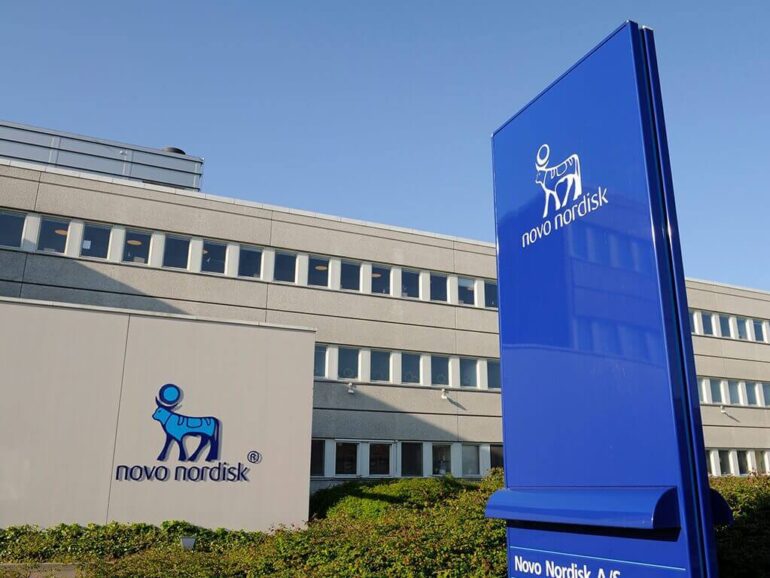TL;DR:
- Novo Nordisk, the pharmaceutical company behind Ozempic, is setting up an AI research hub in King’s Cross, London.
- The new hub aims to leverage British expertise to advance the discovery and development of potential new drug candidates using artificial intelligence.
- Around 40 employees from Novo Nordisk’s research, development, and IT divisions will initially work at the hub.
- The chosen location, the Knowledge Quarter, is known for its strong AI research ecosystem and housing leading tech and pharmaceutical companies.
- Novo Nordisk’s move reflects the UK’s leading role in AI-driven drug development, with companies like Exscientia making significant strides.
- Novo Nordisk’s focus is on weight-loss drugs, including a pill version of Wegovy, and exploring ways to prevent weight gain.
- The weight-loss market is expected to be worth $90 billion (£74 billion) in the coming years.
- Novo Nordisk’s market value has surged by over 45% in response to the high demand for obesity treatments.
- The company is also working on expanding manufacturing facilities in France.
Main AI News:
Novo Nordisk, the pharmaceutical company behind Ozempic, is making strategic moves to establish an AI research hub in the heart of London’s thriving science and technology district. This new initiative reflects their commitment to harnessing British expertise to further enhance their success in the field of weight-loss drugs.
This Danish pharmaceutical giant has secured office space in King’s Cross, London, within the Knowledge Quarter and plans to commence operations in early 2024. Initially, the hub will accommodate approximately 40 employees, bringing together teams from Novo Nordisk’s existing research, development, and IT divisions. The primary objective of this endeavor is to create a “digital innovation hub” that will foster innovation and collaboration in the application of artificial intelligence for the discovery and development of potential new drug candidates.
The chosen location for this endeavor is already home to prominent technology and pharmaceutical companies such as AstraZeneca and Google, as well as esteemed scientific institutions like the Francis Crick Institute and the Alan Turing Institute. A Novo Nordisk spokesperson highlighted that the Knowledge Quarter is renowned for its dynamic AI research ecosystem, dedicated to advancing fields like artificial intelligence, data science, and engineering.
This strategic move enables Novo Nordisk to cultivate closer collaborations with leading research institutions, tech giants, and innovative startups, while also attracting top talent. It is a testament to Britain’s pivotal role in advancing next-generation pharmaceuticals, as the UK continues to lead in the creation of biotech businesses, particularly in the application of AI to expedite drug discovery.
One noteworthy example is Oxford-based Exscientia, which is pioneering the use of AI to accelerate drug development, including a pill designed to prevent Covid. Andrew Hopkins, the CEO of Exscientia, has emphasized that AI technology can significantly reduce the drug development timeline, from four years to just 18 months, and minimize the number of experiments required by up to 90%.
Novo Nordisk’s foray into establishing a “digital innovation hub” aligns with their ongoing efforts to develop the next generation of treatments, building on the strong demand for their obesity drugs. They are currently working on a pill version of their successful weight-loss drug, Wegovy, and exploring strategies to prevent weight gain in the first place, rather than solely focusing on treatment for those already overweight.
The market has responded positively to Novo Nordisk’s endeavors, with the company’s market value surging by over 45% since the start of the year. This growth is driven by the lucrative weight-loss market, which is anticipated to reach a staggering $90 billion (£74 billion) in the near future. In November, Novo Nordisk reported a remarkable 31% increase in operating profits for the first nine months of 2023, primarily due to the high demand for its obesity treatments.
Notably, Novo Nordisk has been working diligently to enhance the supply of both Wegovy and Ozempic, a diabetes drug that is used off-label to combat obesity. Their commitment to expansion is further evident through a recent £1.8 billion deal to expand their manufacturing facilities in France. These strategic moves solidify Novo Nordisk’s position as a leading player in the pharmaceutical industry, poised for further growth and innovation in the years to come.
Conclusion:
Novo Nordisk’s establishment of an AI research hub in London’s Knowledge Quarter underscores the company’s commitment to harnessing artificial intelligence for drug development. This move signifies the growing importance of AI in the pharmaceutical market and positions Novo Nordisk to play a significant role in the evolving landscape of drug discovery and treatment, particularly in the lucrative weight-loss market. As the industry continues to embrace AI, companies like Novo Nordisk are poised for continued growth and innovation.

